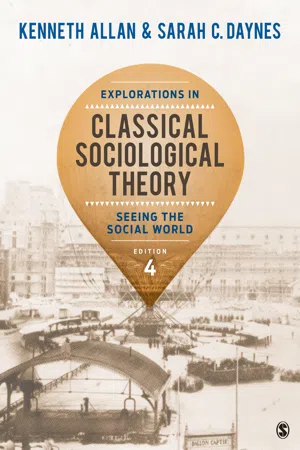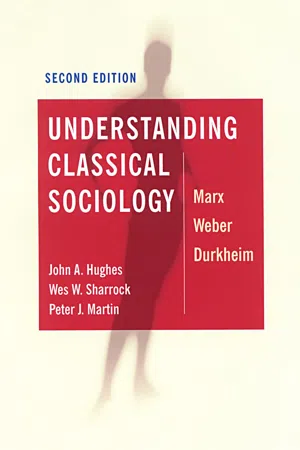Social Sciences
Émile Durkheim Sociology
Émile Durkheim was a prominent figure in the development of sociology, focusing on the study of social facts and the role of institutions in shaping society. He emphasized the importance of social integration and solidarity in maintaining social order and stability. Durkheim's work laid the foundation for the structural-functional approach in sociology, which examines how social institutions contribute to the functioning of society.
Written by Perlego with AI-assistance
Related key terms
6 Key excerpts on "Émile Durkheim Sociology"
- eBook - ePub
- Pip Jones, Liz Bradbury(Authors)
- 2017(Publication Date)
- Polity(Publisher)
positivism as the methodology for the new science of sociology. Durkheim criticized Comte’s work for being over-reliant on philosophical speculation, whereas Durkheim wanted to develop a scientifically precise approach to the carefully controlled strengthening of the moral climate of France in a progressive direction. This was deemed necessary because France was experiencing not only the political and cultural crises mentioned above but also rapid industrialization. This latter had allowed capitalism to develop in an unregulated manner, which led to class conflict, unregulated competition and routinized, degrading, meaningless work (Lukes 1973: 174). All of these issues cried out for the scientific study of society’s collective moral beliefs as sources of social cohesion. Durkheim thus saw the role of sociology as similar to that of a medical physician who applies scientific techniques to distinguish between health and illness and to prescribe the appropriate remedy for the latter. The medicine required in this case was an answer to how the process of transition from traditional to modern values could achieve a balance between respect for individual freedom and a strong sense of community.Social structure
For Durkheim, the crucial feature of social structures is that they are made up of norms and values – cultural definitions of behaviour considered appropriate and worthy in different settings. Since it is through socialization that we learn these normative definitions, it is only this process which moulds people into members of a society and therefore makes social life possible.It was Durkheim who first of all stressed the view that the thoughts and experiences of individuals are inherited, and not invented anew by each generation. For example, people who attend a religious service may believe sincerely in their god. But the beliefs and practices of their religion were in existence before they were – they learned - eBook - ePub
- Pip Jones, Liz Bradbury, Shaun LeBoutillier(Authors)
- 2015(Publication Date)
- Polity(Publisher)
positivism as the methodology for the new science of sociology. Durkheim criticized Comte’s work for being over-reliant on philosophical speculation, whereas Durkheim wanted to develop a scientifically precise approach to the carefully controlled strengthening of the moral climate of France in a progressive direction. This was deemed necessary because France was experiencing not only the political and cultural crises mentioned above but also rapid industrialization. This latter had allowed capitalism to develop in an unregulated and unjust manner and led to class conflict, unregulated competition and routinized, degrading, meaningless work (Lukes 1973: 174). All of these issues cried out for the scientific study of society’s collective moral beliefs as sources of social cohesion. Durkheim thus saw the role of sociology as similar to that of a medical physician who applies scientific techniques to distinguish between health and illness and to prescribe the appropriate remedy for the latter. The medicine required in this case was an answer to how the process of transition from traditional to modern collective values could be best achieved.Social structure
For Durkheim the crucial feature of social structures is that they are made up of norms and values – cultural definitions of behaviour considered appropriate and worthy in different settings. Since it is through socialization that we learn these normative definitions, it is only this process which makes people into members of a society and therefore makes social life possible.It was Durkheim who first of all stressed the view that even the possibilities of thought and experience are inherited, and not invented anew by each generation. For example, people who attend a religious service may believe sincerely in their god. But the beliefs and practices of their religion were in existence before they were – they learned them. Like all other social activity, religious belief and practice is structured by society and by the positions of people in it. As Durkheim puts it:When I perform my duties as a brother, a husband or a citizen and carry out the commitments I have entered into, I fulfil obligations which are defined in law and custom and which are external to myself and my actions. Even when they conform to my own sentiments and when I feel their reality within me, that reality does not cease to be objective, for it is not I who have prescribed these duties; I have received them through education … Similarly the believer has discovered from birth, ready fashioned, the beliefs and practices of his religious life; if they existed before he did, it follows that they exist outside him. (Durkheim 1982 [1895]: 50–1) - eBook - ePub
Explorations in Classical Sociological Theory
Seeing the Social World
- Kenneth Allan, Sarah Daynes(Authors)
- 2016(Publication Date)
- SAGE Publications, Inc(Publisher)
Durkheim sees individuals apart from society as concerned only with their own desires that, because of human nature, are insatiable. Thus, the one thing society needs above all else is a common, moral culture—a set of ideas, values, beliefs, norms, and practices that guide us to act collectively rather than individually. Given that moral culture is the basis of society, Durkheim argues that society first began in religion. Modernity, however, creates a problem that threatens to tear apart society’s moral basis: social diversity created through structural differentiation and the division of labor. The main solution to this problem is an evolving, more general moral culture—able to embrace greater levels of social diversity—through the formation of intermediary groups, restitutive law, the centralization and rationalization of law, and social and structural interdependency.Key Ideas
Social will, state of nature, social contract, primal society, four conditions for social science, social facts, society sui generis, collective consciousness, religion, sacred and profane, ritual, effervescence, social solidarity (mechanical and organic), punitive and restitutive law, the division of labor, social differentiation, cultural generalization, intermediary groups, social pathologies, anomie, suicide (altruistic, fatalistic, egoistic, and anomic), the cult of the individual.The Sociological Imagination of Émile Durkheim
Durkheim was born in France when it was at the cusp of bringing to reality the republican vision of government and enlightenment that began in 1792. Its struggles with monarchs and emperors were coming to an end. The institution of education that had been the purview of the Catholic Church was moving toward scientific, positive instruction. During Durkheim’s lifetime, France made significant strides forward in creating a transportation infrastructure, which gave a boost to economic development and personal income levels. It was a time of hope and forward vision, an environment in which Durkheim thrived.Durkheim’s Life
David Émile Durkheim was born in Epinal, France, on April 15, 1858. Durkheim’s mother, Mélanie, was a merchant’s daughter, and his father, Moïse, was a rabbi, descended from generations of rabbis. Durkheim studied the Hebrew language and Jewish law, no doubt in preparation for becoming a rabbi himself. However, shortly after his Bar Mitzvah at age 13, Durkheim considered Catholicism for a brief time. Durkheim didn’t become Catholic, but neither did he return to his rabbinical studies. He continued on with his secular studies and was considered an outstanding student. With hopes of becoming a teacher, Durkheim moved to Paris to attend the École Normale Supérieure, - eBook - ePub
- H. Scott Gordon(Author)
- 2002(Publication Date)
- Routledge(Publisher)
Durkheim, who led this attack, did not wish to destroy the sphere of individual autonomy altogether, only to reduce it considerably. His insistence upon the existential nature of society was not meant to lay metaphysical foundations for a claim that the conscience collective occupies the whole domain that Descartes had reserved for mind. Nisbet is correct in saying that Durkheimian sociology played an important part in orienting Western social thought away from rationalism and individualism, but its deepest philosophical import was that it converted the Cartesian dualism into a trinitarian ontology, with matter, organic life, and society sharing the domain of existence as categorically different realities. We shall consider this trinity further in Chapter 18 B 1. 3. The sociological point of view Durkheim aimed to establish sociology, not merely as a discipline that investigates a delimited area of social phenomena or specific problems such as the basis of social solidarity, but as the foundation science for all social research. In his view, economics, political science, history, and the other conventionally defined areas of social research cannot achieve scientific status until they adopt the methodological principle that social phenomena must be explained by other social phenomena. The study of the material realm of existence had become scientific by undertaking to explain events in terms of general laws that link material effects to material causes, eschewing theological and other concepts that are non-materialistic in nature. So, likewise, since the social realm has its own ontological autonomy, a truly scientific study of social phenomena aims at the discovery of laws that are exclusively social. Durkheim regarded the social sciences of his time as flawed by their inclination to explain social phenomena in terms of factors that operate at the level of individual consciousness and volition - eBook - ePub
Understanding Classical Sociology
Marx, Weber, Durkheim
- John A Hughes, Wes Sharrock, Peter J Martin(Authors)
- 2003(Publication Date)
- SAGE Publications Ltd(Publisher)
Indeed, the nature of the individual and his or her capacity to make individual decisions has to be understood as a product of society. The very ‘individualism’ of modern society is a result of its social structure. The notion of individualism through which we celebrate our independence and our diversity is itself a socially shared and standardised ideology. It is important to stress that Durkheim does not seek to assert society over the individual, but only to reject a false opposition between ‘individual’ and ‘society’, reminding us that our undoubted autonomy from other individuals is concomitant with our mutual dependence with those same individuals in the social division of labour. And nowhere is the attempt to emphasise this balance in the relationship between individual and society more apparent than in Durkheim’s most famous, not to say notorious, study, Suicide (1893). Autonomy and Constraint Suicide achieved its notoriety through its promotion as the model for sociology as a scientific discipline, and this, largely, because it features the extensive use of statistics. Though Durkheim drew, for this work, upon a well-established French tradition of the study of suicide statistics, his use of such statistics was pioneering. In seeking to understand the causes of stability and change in the suicide rate, Durkheim recognised the fact that in the study of social life the experimental method, which he felt to be so decisive for the success of the natural sciences, cannot be employed. The experimental method is decisive in the natural sciences in singling out causes, and if sociology is to be a science and therefore, on Durkheim’s understanding, to give causal explanations of phenomena, it must contrive some alternative to the experiment - eBook - ePub
The New Criminology
For a Social Theory of Deviance
- Ian Taylor, Paul Walton, Jock Young(Authors)
- 2013(Publication Date)
- Routledge(Publisher)
the historical and structural, conditions for health (order) and disease in a society. In this latter enterprise, his work was not informed by a natural science methodology so much as by a grasp of the dialectics between the needs of men (having the ability to interpret social arrangements as appropriate and/or meaningful) and the arrangements in the structure itself. In short, he had a political sociology of the state, of productive relations, and of social facts in general—none of which is reducible to a simple social biologism. 3 It is worth emphasizing this point here, prior to full discussion of Durkheim’s understanding of the division of labour, inasmuch as it is the view of Durkheim as mechanistic, biologistic and deterministic in a simple sense which has been assimilated as an orthodoxy into the sociologies of crime and social control, which go under the names of systems theory, functionalism, and, most recently, cybernetic ‘theory’. We shall argue later that this ‘translation’ of Durkheim was affected, with good and bad consequences, on the one hand by Talcott Parsons and (to a greater extent, so far as criminology and the sociology of deviance are concerned) by Robert Merton, and, on the other, much less obviously, by the applied sociologists in Chicago who were interested in the ecology of social structure and organization. It is this latter tradition—of Durkheim as social ecologist and a theorist of culture—that leads into contemporary subcultural theory, in particular in relation to juvenile delinquency
Learn about this page
Index pages curate the most relevant extracts from our library of academic textbooks. They’ve been created using an in-house natural language model (NLM), each adding context and meaning to key research topics.





